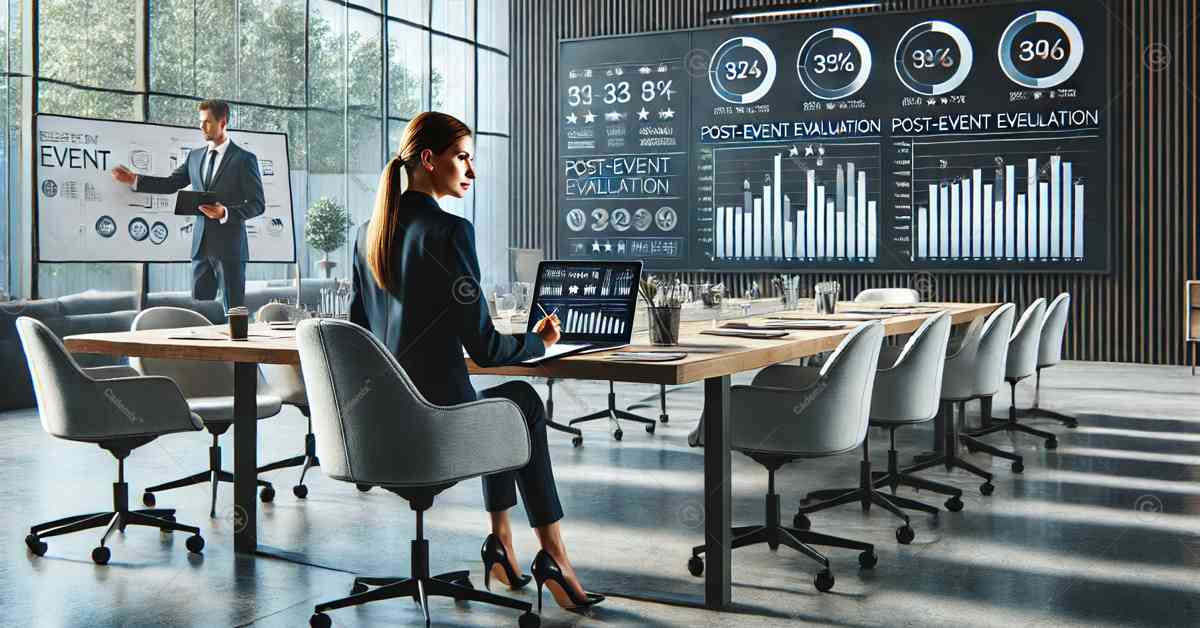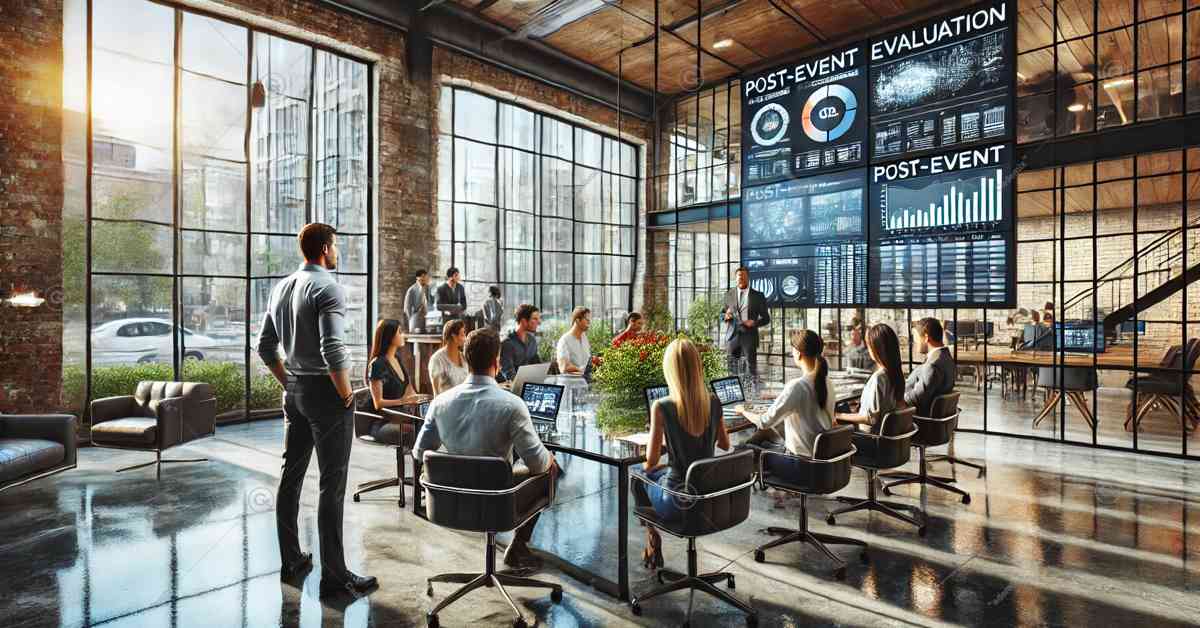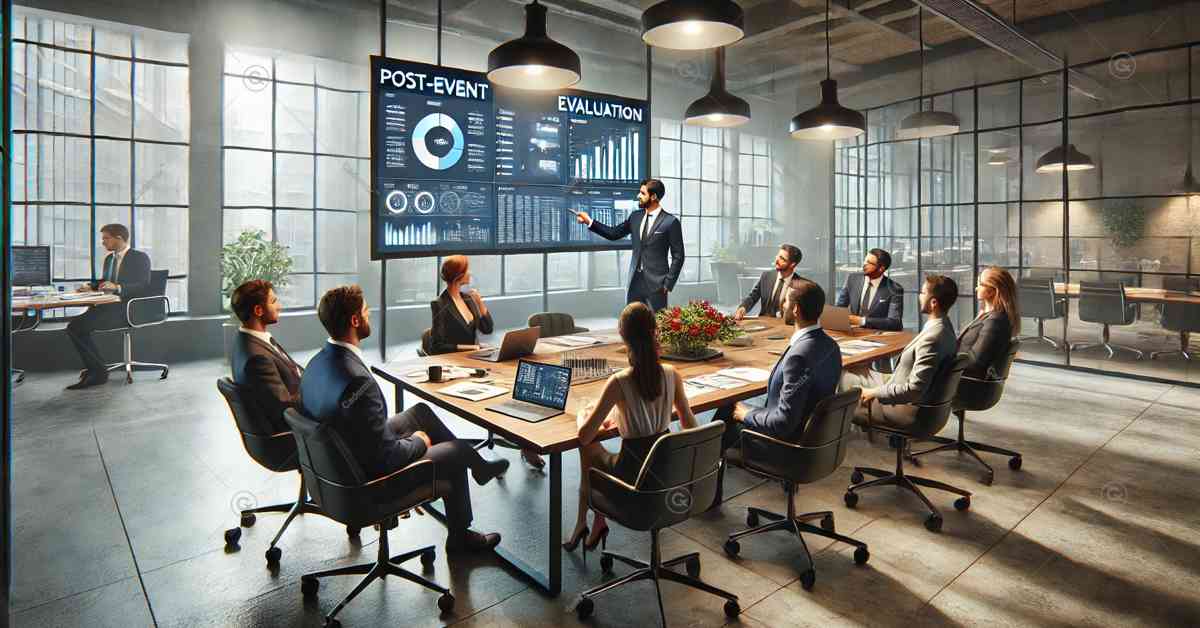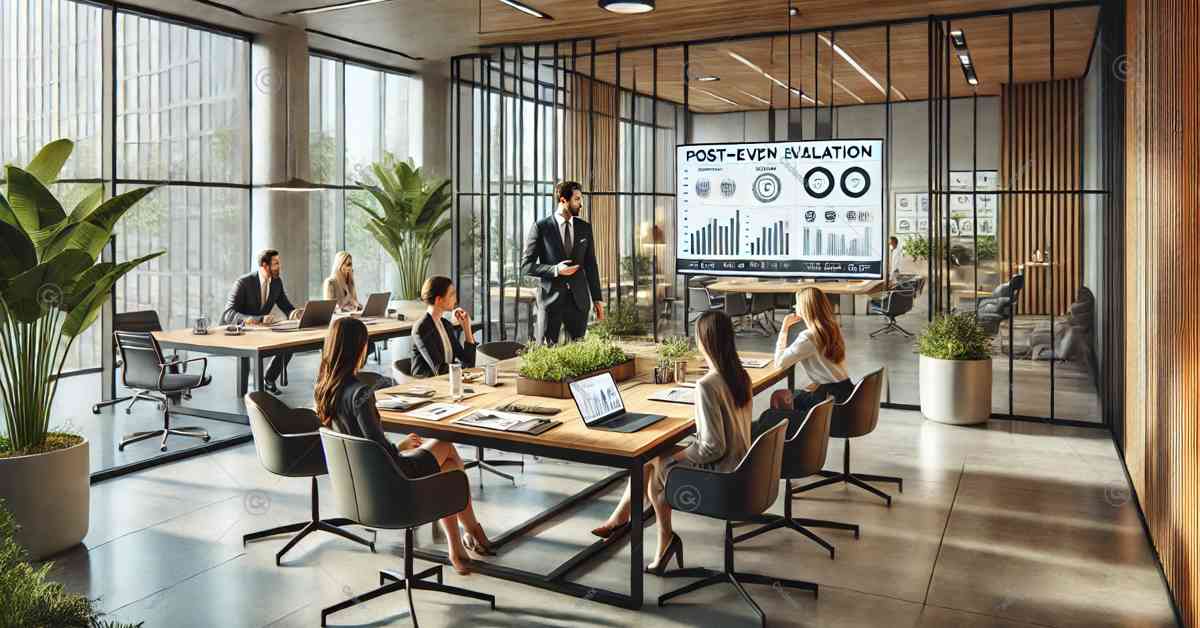Effective post-event evaluation is a critical component of successful event management, driving continuous improvement in event planning and execution. This article explores the importance of post-event evaluations, highlighting how they enhance logistics planning, budget management, and stakeholder satisfaction. By leveraging event technology tools, gathering comprehensive feedback, and analyzing key metrics, event planners can refine their strategies, align with emerging event trends, and ensure long-term success. Whether dealing with hybrid events, international event management, or sustainability goals, incorporating thorough post-event evaluations is essential for optimizing future events and achieving excellence in event management.
By Samareh Ghaem Maghami, Associate Consultant and Project at Cademix Institute of Technology

Introduction
In the dynamic world of event management, the success of an event isn’t just measured by the immediate outcomes but by how well the insights gained can shape future events. Post-event evaluation plays a pivotal role in this process, serving as a crucial tool for continuous improvement in event planning and execution. Whether you’re managing a large-scale international event or a more intimate hybrid gathering, understanding the impact of your event through detailed evaluations can significantly enhance your event marketing strategies, budget management, and overall logistics planning.
By thoroughly analyzing feedback from stakeholders, utilizing advanced event technology tools, and aligning with the latest event trends, such as sustainability and experiential marketing, event planners can refine their approaches and deliver even more successful events in the future. This introduction will delve into the importance of post-event evaluations, explaining why they are essential for optimizing event management practices and ensuring long-term success in a rapidly evolving industry.
The Importance of Post-Event Evaluation
Post-event evaluation is not just a routine task—it’s a powerful strategy that underpins the entire event management process. By systematically assessing every aspect of an event, from logistics planning to attendee satisfaction, event planners can gather invaluable insights that directly influence the success of future events. Effective post-event evaluations enable event managers to identify what worked well and what areas need improvement, ensuring that each subsequent event is more polished, efficient, and impactful.
A thorough post-event evaluation offers a clear view of how well the event met its objectives, including the effectiveness of event marketing efforts, the precision of budget management, and the success of stakeholder management. It also provides a platform to gauge the efficiency of the technology used during the event, assess the sustainability measures implemented, and understand the overall experience delivered to attendees. These insights are crucial in aligning future events with the latest event trends, such as the growing importance of hybrid events and experiential marketing, which are redefining how events are planned and executed in 2024 and beyond.

Moreover, post-event evaluations are essential for maintaining strong relationships with vendors and partners through effective communication, enabling better vendor negotiation and logistical planning for upcoming events. By continuously refining your event planning strategies based on real feedback and data, you can ensure that your events not only meet but exceed the expectations of all stakeholders, solidifying your reputation in the competitive field of event management.
Key Metrics to Evaluate Post-Event Success
To truly harness the power of post-event evaluation, it’s essential to focus on the right metrics—those that offer a comprehensive view of your event’s performance across all critical areas of event management. These key metrics not only help in assessing the immediate success of the event but also provide a roadmap for refining future event planning and execution.
- Event Marketing Effectiveness: One of the primary indicators of a successful event is the effectiveness of your event marketing strategies. Analyzing metrics such as attendee engagement, social media reach, and lead generation can reveal how well your marketing efforts resonated with your target audience. Understanding these aspects allows you to optimize your marketing strategies for future events, ensuring higher attendance and better engagement.
- Logistics Planning and Execution: Smooth logistics are the backbone of any successful event. Evaluating how well your logistics planning translated into seamless execution can help you identify bottlenecks and inefficiencies. Key metrics here include on-time delivery of services, attendee flow management, and the effectiveness of venue utilization. By refining your logistics based on these insights, you can ensure a more efficient event experience in the future.
- Budget Management and Financial Outcomes: Financial performance is a critical aspect of event management. Post-event evaluation should include a thorough analysis of budget adherence, return on investment (ROI), and cost management. Understanding where your budget was most effectively utilized—and where it may have fallen short—enables you to make informed decisions in future budgeting, leading to more financially successful events.
- Event Technology Tools: The integration of technology in events is more important than ever, especially with the rise of hybrid events and virtual components. Evaluating the performance of your event technology tools, such as registration platforms, virtual event software, and attendee engagement apps, helps you determine their effectiveness in enhancing the overall event experience. This analysis is crucial for staying ahead of the curve and incorporating the latest technological advancements in your events.
- Sustainability Metrics: As sustainability becomes increasingly vital in event planning, evaluating your event’s environmental impact is essential. Metrics such as waste management, energy consumption, and carbon footprint provide insights into how sustainable your event was. By focusing on these metrics, you can implement more sustainable practices in future events, aligning with global event trends and enhancing your reputation as a responsible event manager.
By carefully analyzing these key metrics during your post-event evaluation, you can gain a holistic understanding of your event’s success. These insights will not only guide you in making data-driven improvements but also ensure that your future events are more successful, efficient, and aligned with the latest trends in event management.
Gathering Feedback from Stakeholders
One of the most valuable aspects of post-event evaluation is gathering feedback from all stakeholders involved in the event. This feedback provides direct insights into the experience of attendees, vendors, partners, and other key participants, offering a comprehensive understanding of how your event was perceived and where improvements can be made. In the competitive landscape of event management, effective communication with stakeholders is crucial for fine-tuning your event planning processes and ensuring long-term success.
- Best Practices for Effective Communication: Establishing clear and open lines of communication with stakeholders before, during, and after the event is essential for collecting meaningful feedback. Surveys, one-on-one interviews, and focus groups are effective tools for engaging stakeholders and encouraging them to share their honest opinions. By utilizing these methods, event managers can gather detailed insights that reflect the true strengths and weaknesses of the event.
- Utilizing Technology in Events for Real-Time Feedback Collection: In today’s digital age, event technology tools play a significant role in collecting real-time feedback during the event itself. Mobile apps, live polls, and social media monitoring allow for immediate feedback, enabling event planners to address issues on the spot and enhance the overall attendee experience. This instant feedback is invaluable for making quick adjustments and for informing post-event evaluations with up-to-the-minute data.
- The Role of Hybrid Events in Broader Feedback Collection: Hybrid events, which combine in-person and virtual elements, offer a unique opportunity to gather feedback from a broader audience. Virtual attendees can provide insights that may differ from those attending in person, offering a more diverse perspective on the event’s success. By incorporating feedback from both segments, event managers can better understand the full scope of the event’s impact and tailor future events to meet the needs of all participants.
- Incorporating Experiential Marketing Feedback into Future Events: Experiential marketing, which focuses on creating memorable experiences for attendees, is increasingly becoming a core component of event management. Gathering feedback specifically related to these experiential elements can provide valuable insights into what resonated with attendees and what fell short. Understanding these preferences allows event planners to design more engaging and impactful experiences in future events, enhancing overall attendee satisfaction and event success.
- Engaging Vendors and Partners for Insightful Feedback: Vendors and partners are crucial stakeholders whose feedback can provide insights into the logistical and operational aspects of the event. Open communication with these groups can reveal important details about the efficiency of vendor negotiation, the smoothness of logistics planning, and the effectiveness of event technology tools. By incorporating their feedback into your post-event evaluation, you can improve these critical areas, leading to stronger partnerships and more successful future events.
Gathering comprehensive feedback from stakeholders is a cornerstone of effective post-event evaluation. By leveraging this feedback, event managers can make informed decisions that enhance every aspect of event planning and execution. Whether you’re focused on improving communication strategies, optimizing hybrid events, or refining your experiential marketing efforts, stakeholder feedback provides the insights needed to elevate your event management practices and ensure the success of future events.

Tools and Techniques for Post-Event Evaluation
To maximize the effectiveness of post-event evaluation, utilizing the right tools and techniques is essential. These resources not only streamline the process but also ensure that the data collected is accurate, actionable, and aligned with your overall event management goals. In an industry where technology plays a pivotal role, staying ahead by leveraging advanced tools and proven techniques can significantly enhance your event planning and execution.
- Utilizing Event Technology Tools for Data Collection and Analysis: In the realm of modern event management, technology is a game-changer. Event technology tools such as attendee management systems, feedback apps, and data analytics platforms are indispensable for collecting and analyzing post-event data. These tools provide real-time insights into attendee behavior, engagement levels, and overall satisfaction, allowing event planners to make data-driven decisions that improve future events. By integrating these tools into your post-event evaluation process, you ensure a comprehensive understanding of your event’s impact.
- The Role of Surveys, Interviews, and Focus Groups in Post-Event Evaluations: Traditional methods of feedback collection, such as surveys, interviews, and focus groups, remain highly effective in gathering qualitative data. Surveys distributed via email or through event apps can capture a wide range of responses, while in-depth interviews and focus groups provide detailed insights into specific aspects of the event. These techniques allow you to dive deeper into attendee experiences, uncovering nuances that may not be evident through quantitative data alone. Incorporating these methods into your post-event evaluation ensures a well-rounded analysis that covers all bases.
- How International Event Management Differs in Evaluation Techniques: When managing international events, the complexity of post-event evaluation increases due to cultural differences, language barriers, and varying expectations. It’s crucial to tailor your evaluation techniques to suit the diverse needs of international audiences. Utilizing multilingual surveys, culturally sensitive focus groups and region-specific data analysis tools can help you gather more accurate and relevant feedback. By adapting your evaluation approach to the international context, you ensure that your events resonate with a global audience and meet the unique challenges of international event management.
- Leveraging Marketing Strategies to Enhance Feedback Collection: Effective event marketing doesn’t stop at promoting the event; it extends into the post-event phase where it can significantly enhance feedback collection. By incorporating calls-to-action in your marketing materials that encourage attendees to participate in surveys or provide testimonials, you can increase the volume and quality of feedback. Social media campaigns, email follow-ups, and personalized outreach are all powerful strategies to boost engagement and ensure that you gather the insights needed for a thorough post-event evaluation.
- Integrating Data from Hybrid Events into the Evaluation Process: Hybrid events, which combine both virtual and in-person experiences, require a unique approach to post-event evaluation. It’s essential to use tools that can seamlessly integrate data from both components, providing a holistic view of the event’s success. Metrics such as virtual attendance, online engagement, and the effectiveness of digital content must be considered alongside traditional in-person metrics. By effectively integrating this data, you can gain a complete picture of the event’s performance and make more informed decisions for future hybrid events.
By employing these tools and techniques, event managers can conduct more thorough and accurate post-event evaluations, leading to actionable insights that drive continuous improvement. Whether you’re leveraging the latest event technology tools, adapting to the complexities of international event management, or refining your marketing strategies, these approaches ensure that your post-event evaluations are both effective and aligned with your overall event management objectives. This commitment to rigorous evaluation is key to staying competitive and achieving excellence in the evolving landscape of event planning.
Applying Post-Event Evaluation to Future Events
The insights gained from a comprehensive post-event evaluation are invaluable for refining and enhancing future events. By systematically applying the lessons learned, event managers can drive continuous improvement in every aspect of event management, from creative planning to logistical execution. This forward-thinking approach not only elevates the quality of future events but also ensures that they align with emerging trends and meet the evolving expectations of attendees and stakeholders.
- Using Feedback to Enhance Creativity in Event Planning: One of the most significant benefits of post-event evaluation is the ability to incorporate attendee and stakeholder feedback into the creative process of event planning. By understanding what resonated with your audience—whether it’s the event theme, interactive elements, or overall atmosphere—you can infuse future events with fresh, innovative ideas that build on past successes. This approach not only keeps your events engaging and relevant but also strengthens your reputation as a forward-thinking event manager.
- Integrating Evaluation Insights into Event Planning and Project Management: Effective project management in event planning hinges on the ability to learn from past experiences. The data and insights gathered from post-event evaluations should be systematically integrated into the planning process for future events. This includes refining timelines, adjusting budget allocations, and optimizing resource management based on what worked well and what didn’t. By applying these insights, you can streamline your project management practices, reduce risks, and ensure a smoother execution of future events.
- Improving Vendor Negotiation and Logistics Planning Based on Past Events: Vendor negotiation and logistics planning are critical components of successful event management. Post-event evaluations provide a wealth of information about the performance of vendors, the efficiency of logistics, and the effectiveness of venue utilization. By analyzing this data, you can make informed decisions that improve vendor relationships, negotiate better terms, and enhance logistical efficiency in future events. This not only reduces costs but also ensures that your events run more smoothly and deliver a superior experience to attendees.
- Adapting to Event Trends 2024 Using Post-Event Data: The event industry is constantly evolving, with new trends emerging each year. Post-event evaluations offer valuable insights into how well your events align with these trends, such as the increasing focus on sustainability, the rise of hybrid events, and the growing importance of experiential marketing. By analyzing feedback and performance data in the context of these trends, you can adapt your event planning strategies to stay ahead of the curve. This proactive approach ensures that your events remain relevant, innovative, and appealing to a broad audience.
- Maximizing Stakeholder Satisfaction and Engagement: Stakeholder satisfaction is a key indicator of event success. By applying the insights gained from post-event evaluations, you can better understand the needs and expectations of stakeholders, including attendees, sponsors, vendors, and partners. This allows you to tailor your event planning and execution strategies to meet those needs more effectively, resulting in higher satisfaction and stronger engagement. A focus on stakeholder satisfaction not only improves the immediate success of your events but also fosters long-term relationships that are essential for sustained success in event management.
Applying the insights from post-event evaluations to future events is a strategic move that enhances every facet of event management. By using these evaluations to drive creativity, refine project management, improve logistics, adapt to industry trends, and maximize stakeholder satisfaction, event managers can continuously elevate the quality and impact of their events. This commitment to learning and improvement is what sets successful event managers apart in a competitive industry, ensuring that each event is more successful than the last and firmly establishing their expertise in the field.

Challenges in Post-Event Evaluation
While post-event evaluation is a powerful tool for improving event management practices, it is not without its challenges. Navigating these challenges effectively is crucial for ensuring that the evaluation process yields meaningful and actionable insights. By understanding and addressing these common pitfalls, event managers can enhance the accuracy and effectiveness of their post-event evaluations, leading to more successful and impactful future events.
- Common Pitfalls in Post-Event Feedback Collection: One of the most significant challenges in post-event evaluation is gathering comprehensive and honest feedback from attendees and stakeholders. Many attendees may be reluctant to complete surveys or may provide incomplete responses, which can skew the data. To overcome this, event managers should use a combination of feedback collection methods, such as short, engaging surveys, in-app polls, and direct communication during the event. Incentivizing feedback can also increase participation, ensuring that you collect the data needed for a thorough evaluation.
- Balancing Budget Management with Comprehensive Evaluations: Conducting a detailed post-event evaluation can sometimes strain the event’s budget, especially if extensive resources are required for data collection and analysis. This challenge requires event managers to strike a balance between thorough evaluation and budget management. Leveraging cost-effective event technology tools, such as automated survey platforms and data analytics software, can help streamline the evaluation process without compromising on quality. By prioritizing key metrics and focusing on the most critical areas for improvement, you can conduct a comprehensive evaluation within budget constraints.
- Overcoming Communication Barriers in International Event Management: International events add a layer of complexity to post-event evaluations due to language differences, cultural variations, and varying levels of technological access. These factors can make it challenging to gather consistent and comparable feedback across different regions. To address this, event managers should use multilingual surveys, culturally adapted questionnaires, and region-specific data collection methods. Additionally, collaborating with local partners who understand the cultural context can enhance communication and ensure that feedback is both accurate and relevant.
- Ensuring Accurate and Honest Feedback from Stakeholders: Stakeholders, including sponsors, vendors, and partners, may sometimes provide feedback that is overly positive or cautious, especially if they have ongoing relationships with the event organizer. This can lead to a skewed perception of the event’s success. To encourage more honest and accurate feedback, event managers should foster an environment of open communication and trust. Offering anonymous feedback options and emphasizing the importance of constructive criticism can help stakeholders feel more comfortable sharing their true opinions. This candid feedback is essential for making genuine improvements in future events.
- Navigating the Complexity of Hybrid Events in Post-Event Evaluation: Hybrid events, which combine in-person and virtual experiences, present unique challenges in post-event evaluation. The dual nature of these events requires event managers to collect and analyze data from both physical and digital platforms, which can be complex and time-consuming. Ensuring that the evaluation process captures the full scope of the event experience—from virtual attendee engagement to on-site logistics—requires a well-coordinated approach. Utilizing integrated event technology tools that can seamlessly merge data from both components of the event is crucial for a comprehensive evaluation.
By recognizing and addressing these challenges, event managers can significantly enhance the effectiveness of their post-event evaluations. Whether it’s overcoming communication barriers in international event management, balancing budget constraints, or ensuring honest feedback from stakeholders, navigating these obstacles is key to unlocking the full potential of post-event evaluations. This proactive approach not only improves the quality of your evaluations but also ensures that the insights gained are truly actionable, leading to more successful and impactful events in the future.
Conclusion: The Role of Post-Event Evaluation in Achieving Long-Term Success
In the ever-evolving field of event management, the ability to learn and adapt is crucial for long-term success. Post-event evaluation is the cornerstone of this continuous improvement process, offering event managers the insights needed to refine their strategies, enhance their planning, and deliver increasingly successful events. By thoroughly analyzing every aspect of an event—from marketing effectiveness to logistical execution—event managers can ensure that each subsequent event surpasses the last in quality, efficiency, and attendee satisfaction.
The data and feedback collected during post-event evaluations are not just tools for reflection; they are actionable insights that drive future event planning and execution. By applying these insights, event managers can innovate in areas like creativity in event planning, optimize budget management, and stay ahead of the latest event trends, such as sustainability and hybrid event formats. This commitment to rigorous evaluation and continuous improvement is what sets top-tier event managers apart, enabling them to consistently deliver events that resonate with attendees, meet stakeholder expectations, and align with broader industry trends.
Furthermore, post-event evaluation plays a vital role in building and maintaining strong relationships with all stakeholders, including attendees, vendors, and partners. By demonstrating a commitment to learning from feedback and making data-driven improvements, event managers can foster trust and loyalty, ensuring ongoing support and collaboration for future events. This approach not only enhances individual events but also contributes to the overall growth and reputation of the event management business.
In conclusion, post-event evaluation is not just a task to be completed after an event; it is an integral part of the event management lifecycle that drives excellence and innovation. By prioritizing comprehensive evaluations, leveraging advanced event technology tools, and applying the insights gained to future events, event managers can achieve sustained success in a competitive industry. As you plan your next event, remember that the key to continuous improvement lies in the lessons learned from the past lessons that are unlocked through diligent and thorough post-event evaluation.

About the Author
Samareh Ghaem Maghami is an experienced event manager and interior decorator with a strong background in creative planning and executive work. Currently, she is a member of the Cademix Institute of Technology, where she continues to refine her skills and contribute to the field of event management. With a Master’s degree from Wiener Neustadt and years of practical experience in both Iran and Austria, Samareh brings a unique perspective to her work, blending artistic creativity with strategic event planning. Her expertise is showcased in various articles, including her recent publication on “Sustainability in Event Planning: How to Go Green,” available in the Cademix Magazine.
To explore more of her insights or to discuss collaboration opportunities, feel free to reach out to Samareh directly or read her other articles on the Cademix platform.
Please feel free to contact her at:
E-mail: sam.gh.maghami@gmail.com
E-mail: samareh.ghaem-maghami@cademix.org
LinkedIn: https://www.linkedin.com/in/samareh-ghaem-maghami
Xing: https://www.xing.com/profile/Samareh_GhaemMaghami

